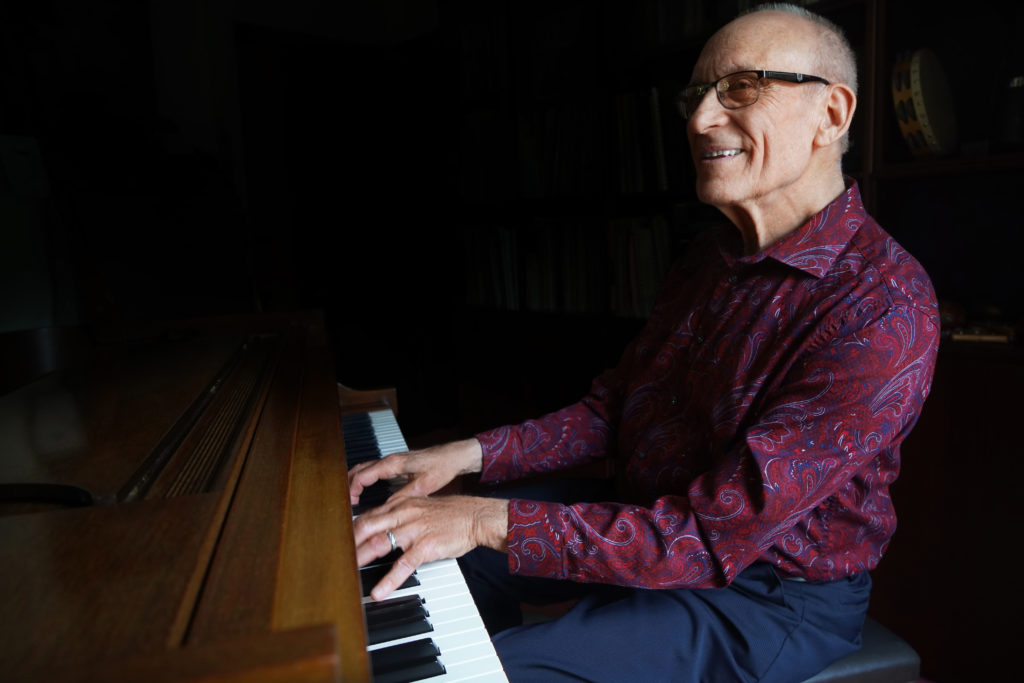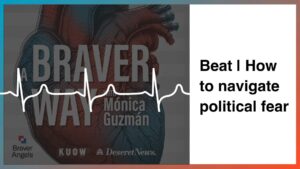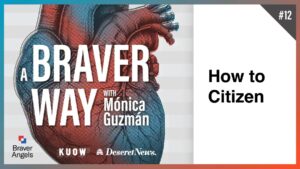Lou Walinsky is 88 keys of pure American joy.
A pianist, arranger, and improviser, Lou has spent the last 40 years building his repertoire into a musical melting pot: he’s got Gershwin, Billy Joel, and Pharrell; he’s got sea chanteys, spirituals, and Broadway tunes; he’s got old classics and new classics—a little something for everyone.
When Lou submitted his Artist of the Month application, what stood out most was his earnest and welcoming spirit. Throughout his career, he’s witnessed firsthand the power of music to unite every age, gender, race, nationality, and political party on the dance floor. It’s hard to bicker with your neighbor, after all, when you’re both tapping your toes in time.
Lou and I chatted about how he came to the keyboard (unintentionally!) through songwriting first. He told me about his stunningly diverse live program, Piano Works: Solo Piano Interpretations of The Great American Songbook and Beyond, and what he believe makes a song distinctly American. And we talked about bridge-building, something that continues to be an important motivator in Lou’s musical work and daily life.
Meet Lou Walinsky, piano man. Follow his journey on Instagram and Facebook, and subscribe to his YouTube channel to catch the next video.
Background
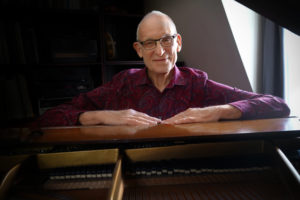 Alma Cook: It’s an honor to speak with you, Lou! I’d love to learn more about your background. What’s your musical origin story?
Alma Cook: It’s an honor to speak with you, Lou! I’d love to learn more about your background. What’s your musical origin story?
Lou Walinsky: It’s a story with a lot of twists and turns. I started off studying classical piano at age 9, and I continued with several different teachers all the way through the end of college. By that point, I had also picked up a guitar and a banjo, and—like many of my generation at that time—was playing folk music and writing my own songs as well. When I would go to perform those songs in clubs, accompanying myself on piano, a typical comment would be: “really liked your piano playing.”
There I was, performing my own songs, and people were commenting on my piano playing! My goal had been to use my quite ordinary voice in a way that worked, something like what Bob Dylan was able to do. But it was clearly my piano playing that stood out! That was one of a number of factors that brought me back to focusing on piano. I went on to study classical music improvisation at the Dalcroze School of Music in New York City, later studying jazz piano with some great jazz artists in New York. I then started my playing career by working with local bands of one kind or another.
AC: You perform a program called Piano Works: Solo Piano Interpretations of The Great American Songbook and Beyond. The repertoire is incredibly diverse—everything from the classic folk song “Shenandoah” to Pharrell’s “Happy.” Tell me how this program came about and how you curated the tunes.
LW: It’s really a mix of all the music I have played and all of my life experiences. Music has always spoken to me poignantly and emotionally—music from all different genres and styles. In addition to being a serious classical musician as an avocation for most of my life, I spent years playing “club dates,” which requires knowing a huge number of pop and swing tunes. In addition, I’ve played in jazz bands and in a klezmer band. I love Irish music, reggae, country, Jewish music, Latin music, and more—really, any music that feels soulful to me.
I have been in awe of some great solo jazz pianists—people like Art Tatum, Oscar Peterson, Dick Hyman, Chick Corea, Keith Jarrett, Bill Evans, Bud Powell, and Hiromi—as well as classical composers who wrote extraordinary pieces for solo piano, including Chopin, Schumann, Beethoven, and Gershwin to name but a few.
With all of that, I simply started fooling around at the piano years ago with tunes that I liked, just to see what I could come up with. I think this process has grown to be a fruitful creative endeavor. The piano is an extraordinarily versatile instrument, and it can be very powerful and self-sufficient all on its own. My goal with Piano Works is to create piano interpretations that are complete works of art in themselves.
I understood that Braver Angels was a unique forum—a safe space, if you will—for people to be themselves without having to censor themselves for fear of being cancelled or shunned socially.
Lou Walinsky Tweet
AC: I know that you’re a member of Braver Angels. What drew you into our organization’s cause?
LW: I first heard about Braver Angels this past fall, when I was asked to join a local discussion group based in Philly led by a BA facilitator. I joined, and I was impressed with the high level of conversation and the desire of the members to listen to all sides of whatever topic we were discussing. This was so different from what was happening all over the country, with so many people not listening to or trying to understand any views other than their own. I understood that Braver Angels was a unique forum—a safe space, if you will—for people to be themselves without having to censor themselves for fear of being cancelled or shunned socially. From there, it was a hop, skip, and a jump to join the national organization.
Deep Dive
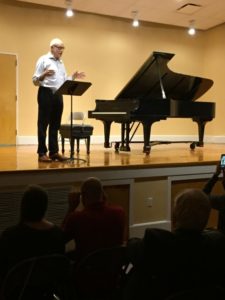 AC: I’m not totally sure what I mean when I say this, but the tunes you play feel so distinctly American (“Lift Every Voice and Sing,” “Danny Boy,” “Isn’t She Lovely”). Do you agree? What makes a song “American” to you?
AC: I’m not totally sure what I mean when I say this, but the tunes you play feel so distinctly American (“Lift Every Voice and Sing,” “Danny Boy,” “Isn’t She Lovely”). Do you agree? What makes a song “American” to you?
LW: It’s not for nothing that you get that impression, since my concert program is largely based on The Great American Songbook. Many of the arrangements I’ve created are based on standards that feel like the landscape of America. While we’ve grown up with the older tunes, the more contemporary standards quickly become part of us as well. The tunes come from the worlds of jazz, swing, pop, folk, country, blues, and other genres, and all are much associated with America.
My arrangements include the sea chantey “Shenandoah,” Billy Joel’s “New York State of Mind,” and Gershwin’s “I Got Rhythm.” There’s Scott Joplin’s “The Entertainer,” Fats Waller’s “Ain’t Misbehavin’,” and Charlie Parker’s “Donna Lee.”
Tunes like “Climb Every Mountain” from the Sound of Music and “The Best of Times” from La Cage Aux Folles are there to represent Broadway. Then there are the tunes that fall into the “beyond” category—songs that have become absorbed into American culture like “La Vie En Rose” (French), “Gracias a la Vida” (Spanish), and “Mahna de Carnaval” (Brazil).
AC: Do you have any favorite political anthems from America’s history? Are you drawn primarily to the message or to the music itself?
LW: I was active in the civil rights movement in high school and in college, and I love and have been influenced by many of the songs from that movement—both the music and the message. Songs like “We Shall Overcome,” “Oh Freedom,” and “Get On Board That Freedom Train” all resonated with me. I am very inspired by the song known as the Black National Anthem, “Lift Every Voice and Sing.” (I was teaching music in the Philly schools back in the 90s, and one school I was working at had the kids sing that song every day in the morning assembly. I accompanied this morning ritual on the piano and had a blast experimenting with playing it slightly differently every day—different keys, harmony, and tempos, with a little improv thrown in!)
I also love the American patriotic songs. I cannot listen to a recording of Marian Anderson singing “My Country ‘tis of Thee” at the Lincoln Memorial with dry eyes. I get chills in my spine when I listen to “America” (“Oh beautiful, for spacious skies…”) and I find “The Star Spangled Banner” equally spine-chilling.
I love the American patriotic songs. I cannot listen to a recording of Marian Anderson singing 'My Country ‘tis of Thee' at the Lincoln Memorial with dry eyes.
Lou Walinsky Tweet
AC: Tell me how you see the role of music in the political realm. It’s always seemed to me that there are two roles music can play in politics: one, in helping folks put their differences aside and just fellowship together, and two, in using the arts to speak out about specific causes. Do you resonate with one of those more than the other?
LW: I’m definitely in the former camp. The music is the message for me, and I aim to create the most interesting and inspiring music that I am capable of. In general, I think there needs to be places and spaces where people of differing beliefs can come together and engage in the kind of shared in-depth experiences that make us human and alive. Music has a very important role to play in this regard.
I also think that society at large would do well to learn from musicians and artists, who generally welcome and embrace diverse sources and perspectives from far and near as we seek out our artistic truth. Similarly, in politics, it would be helpful to welcome a diversity of viewpoints to add depth to our understanding and to help shape our views.
AC: In 1996, you were diagnosed with bilateral carpal tunnel syndrome. I can only imagine how devastating that would be for a keys player! How did you digest the diagnosis, and how did you ultimately overcome it?
LW: The thought that I was unable to use my hands—and that I would have to give up piano—was indeed quite an emotional shock at first.
I first went to a hand surgeon, who advised me to have the carpal tunnel release surgery in both hands. While that seemed like a good idea at first, there were other kinds of health practitioners who advocated methods of dealing with carpal tunnel syndrome (CTS) other than surgery. I wound up buying into the idea that I had gotten CTS because I was not utilizing my body properly, both at the piano and with other activities as well. It made sense to me that, unless I changed the way I was using my hands and my body, even if I had successful CT surgery I would wind up recreating the same problem.
I actually spent four or five years going to a variety of practitioners. I first went for sessions with a chiropractor, then with a physical therapist, and then with an acupuncturist. These sessions were all helpful to some extent, but my CTS symptoms remained basically the same. I then learned about “body workers” of various kinds, and I went to practitioners of Feldenkreis, Alexander Technique, Egoscue, and Rolfing. These were all excellent approaches with talented practitioners, and by this time my CT symptoms were minimal. But the fact is that when I went back to playing technically demanding piano pieces, my symptoms returned. I was able to play club dates and play piano for parties, but was unable to do any heavy lifting technically at the piano without carpal tunnel repercussions.
Finally, I discovered the Taubman Technique and the person who became my teacher for a number of years, Sheila Paige. Sheila, a classical pianist, had learned the techniques of healthy playing from her teacher, Dorothy Taubman, who had figured out how pianists could play even the most technically demanding piano pieces without taxing the body. Sheila expanded on what became known as the Taubman Technique, and she incorporated some of the teachings of Feldenkreis, Alexander, and Egoscue to form her own Piano Wellness approach. From my studies with Sheila, I was finally able to regain my ability to play technically demanding pieces without injuring my hands.
It was all quite a journey, but now I’m able to play just about anything on the piano quite comfortably.
Quick Takes
AC: Which do you find more moving: in-person performances or recorded ones?
LW: That’s an easy one: in-person performances, by a long shot. There is nothing like getting immediate feedback from an audience.
AC: Have you participated in a Braver Angels workshop or debate? What was the topic, and how did it go?
LW: I watched a debate about the 2020 election and was impressed by the extraordinarily high level of intellectual discourse. It was thrilling to see so many articulate people who expressed themselves civilly with each other.
But really, my main involvement has been with my local group—we have now renamed our group Mobius—which grew out of the Braver Angels discussion group that started in the fall. It has evolved into a group that meets every other week, where each member takes a turn at being the chairperson and leads a discussion on the topic of the chairperson’s choice. Recent topics have included race, climate change, the 2020 election, the Israel/Palestinian conflict, and COVID-19. The basic Braver Angels rules about civility apply and are upheld.
AC: What are the political issues you care most about? How do you engage as a citizen?
LW: There are a multitude of issues that I care about. But the biggest issue I’m concerned about is that Americans are currently divided into essentially two hostile camps, each speaking a different language with a different set of facts and understandings on any given issue. Each side sees the other as the enemy as it reads, watches, and listens only to its own media—which has evolved into very partisan reporting—and speaks only with people who are on the same page as themselves. Each side is in its own silo without being able to speak civilly to each other and really listen. If we are going to solve any of the many issues currently plaguing our society, we will need to treat each other with humanity and respect in order to reach meaningful compromise.
AC: Do you have many friends or collaborators across the aisle? How do you navigate these differences?
LW: I have friends, relatives, colleagues, and neighbors of all different political stripes. The fact is, I’m able to have productive and civil conversations with some people but not so with others. That’s just the way it is now. It’s sad that there are many people who are simply too steeped in their beliefs to hear another perspective. I simply proceed on a person-by-person basis.
What's Next?
AC: As a musician myself, I know that the pandemic has been a challenge for musicians of all stripes, significantly curbing our opportunities for live performance in particular. How have you decided to make the most of this unique time?
LW: The pandemic allowed me the time to focus on creating new arrangements and on learning new skills. I learned the process of doing two-camera video shoots of my arrangements and editing/publishing them onto YouTube. Last summer, I kickstarted a project of 10 new videos in 10 weeks. It was a huge learning curve for me with lots of details to learn, but—with help from a few friends and through trial and error—I was able to make quite a bit of progress during that time. I used a number of these videos in a few different online arts festivals that I was invited to participate in. I’ve continued to make videos, and now I’m looking forward to getting back to live performance.
AC: Have the current events of 2020 or 2021 inspired any new pieces from you?
LW: I’ve done quite a bit of listening during this time, listening to some of my musical mentors aforementioned—Art Tatum, Oscar Peterson, Dick Hyman, Chick Corea, Keith Jarrett, Bill Evans, Bud Powell, and Hiromi, and more—as well as listening to my own playing. I’m hoping that this has somehow filtered into my own arranging and playing and helped bring my music up to the next level.
AC: What do you ultimately want to be known for?
LW: I would like to be known for creating and performing interesting and soulful music that listeners find touching and engaging. I would also like to be known as a thoughtful person who is able to help create a more civil society by engaging constructively with people on a whole range of issues while simultaneously standing up for issues that are important to me.

